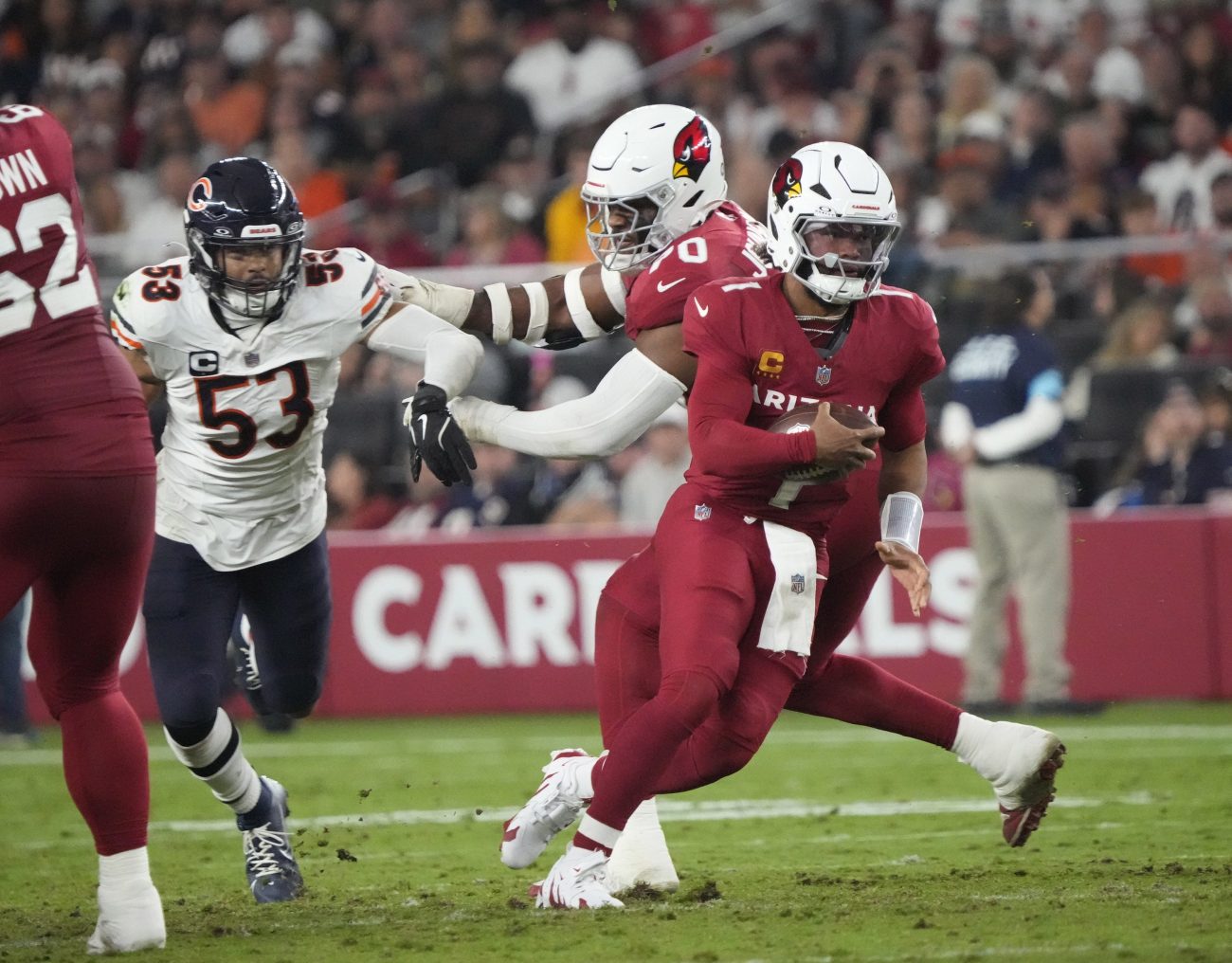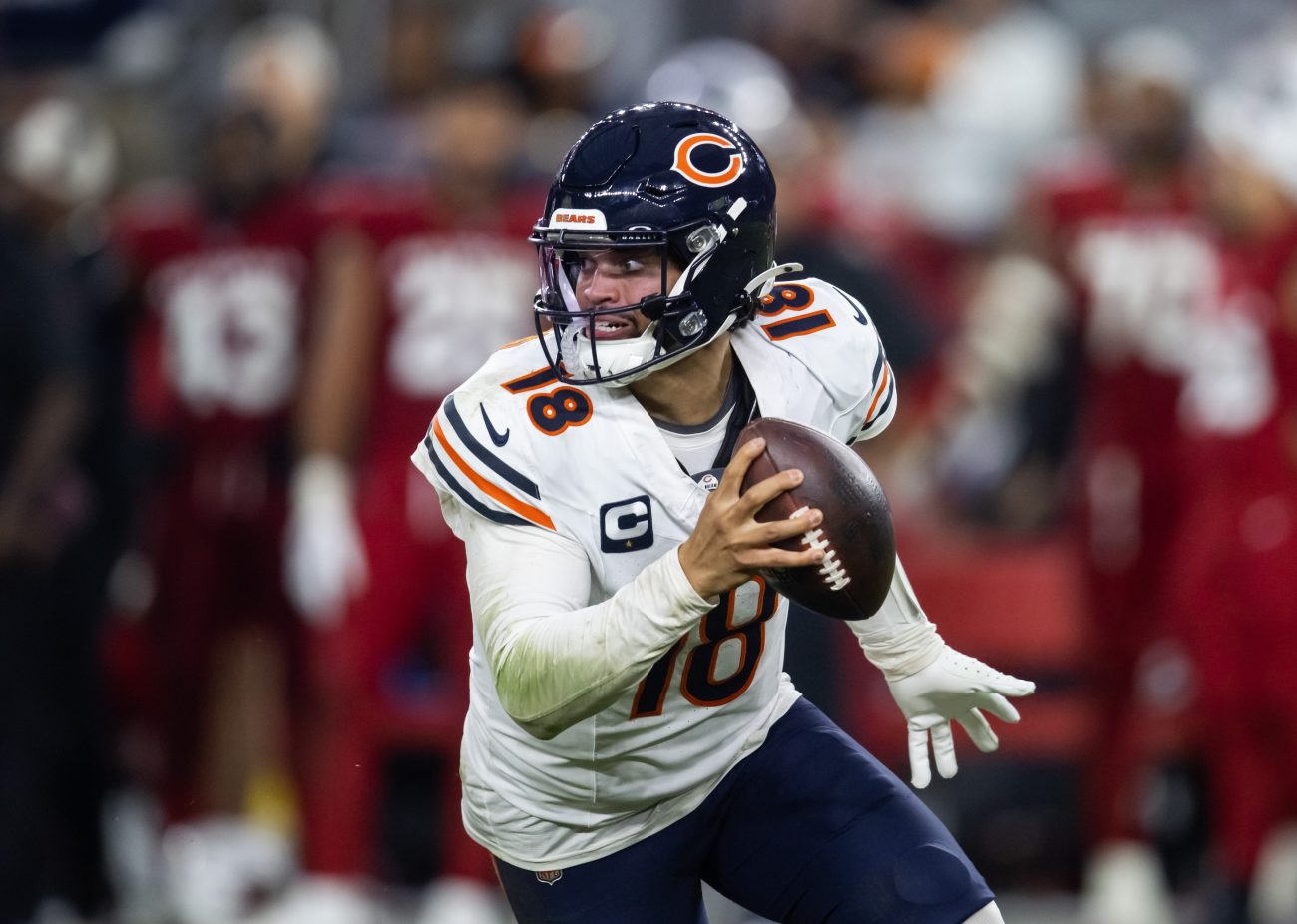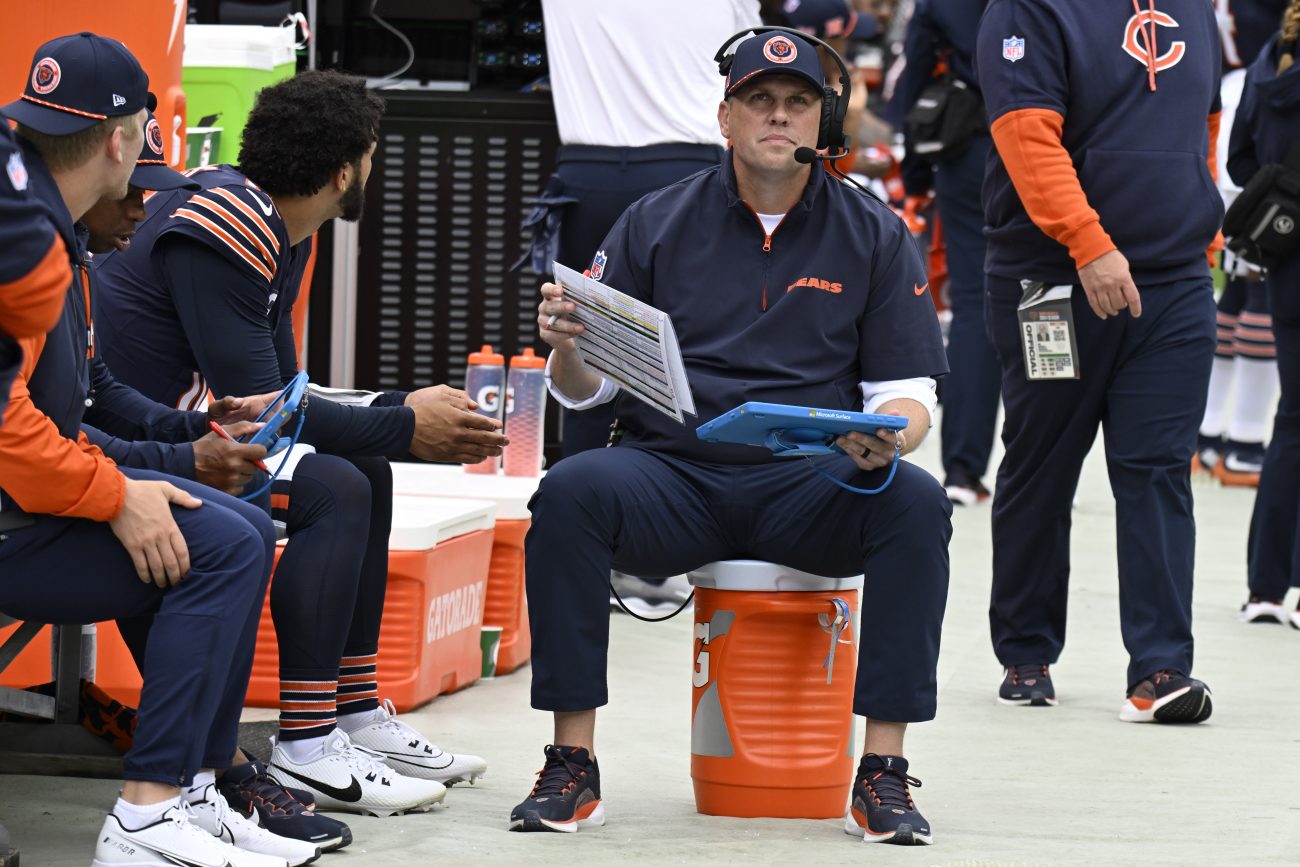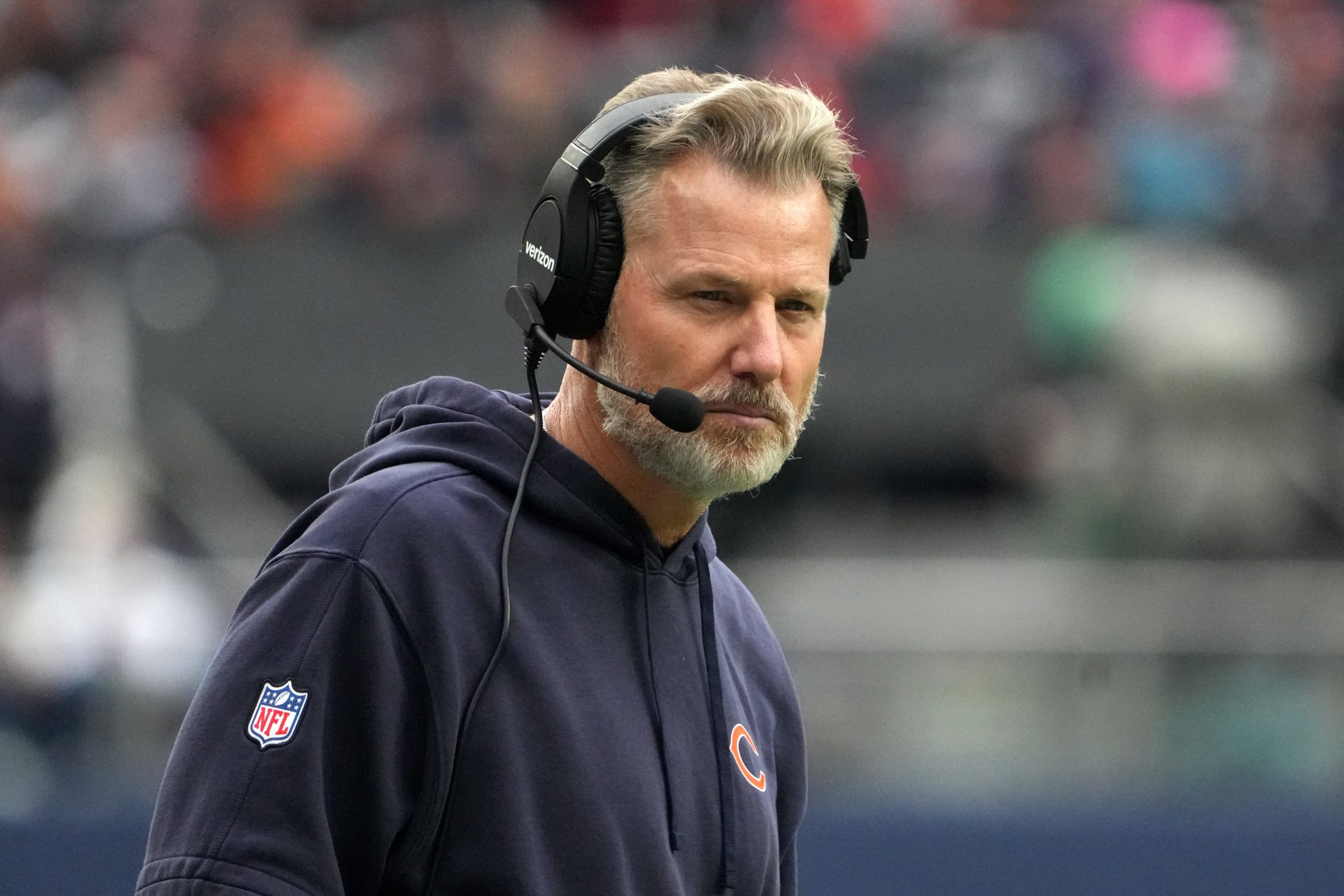Despite improvements to the Chicago Bears offense, the unit is still struggling. As a result, offensive coordinator Shane Waldron is in the hot seat. However, the team does not feel a need for change yet.
The Chicago Bears have no immediate plans to replace offensive coordinator Shane Waldron, who, despite challenges, maintains strong support from the organization. Waldron, known for his methodical and innovative offensive style, is seen as a coach who provides a stable, long-term vision.
Waldron’s background with the Seattle Seahawks honed his skills in scheming for high-tempo, flexible play that keeps defenses guessing. However, except for small stretches at a time, it has not happened.
Although recent offensive struggles have raised concerns from fans, Chicago Bears leadership remains confident in Waldron’s capacity to adapt and improve the offense over time. They don’t feel that an eight-game sample size is enough to make a change.
The McCaskeys are averse to making huge changes in the middle of the season. They are willing to let the season play out and see what happens.

© Michael Chow/The Republic / USA TODAY NETWORK via Imagn Images
After an embarrassing 29-9 loss to the Arizona Cardinals in Week 9, Chicago Bears head coach was asked about a possible change in play-caller. He was emphatic in his response.
Matt Eberflus was asked whether the Bears will change offensive play callers. He said no.
“We’re looking to find answers and that’s where it’s at.”
— Courtney Cronin (@CourtneyRCronin) November 4, 2024
One reason for Waldron’s support stems from the Bears’ belief that their offensive issues are less about play design and more about execution on the field. The team is working through a developing roster, with new players still adjusting to Waldron’s schemes.
For instance, quarterback Caleb Williams has shown flashes of brilliance but continues to navigate the transition to a more complex NFL offense. Despite mistakes, the organization believes in his growth under Waldron’s mentorship, which is one of the reasons they haven’t rushed into major changes.

© Mark J. Rebilas-Imagn Images
The offensive coordinator’s experience with dual-threat quarterbacks also helps bolster his credibility. In Seattle, he adapted play-calling to Russell Wilson and Geno Smith’s strengths, allowing for both designed runs and explosive passing options.
With the Chicago Bears, Waldron has gradually introduced similar versatility, giving Williams the freedom to either extend plays or utilize his mobility. This dynamic has proven effective when executed well, making the team optimistic that results will improve as players acclimate.
The problem has been mistakes made during critical moments of games. In Week 8 against the Washington Commanders, the offense was struggling. However, late in the game, they found themselves inside the Commanders’ five.
Instead of doing what has been working this season, giving the ball to either Roschon Johnson or D’Andre Swift and having offensive lineman Doug Kramer be the lead blocker, Waldron called for Kramer to get the ball. He could not get the handoff from Williams clearly and fumbled the ball. Washington recovered it.
There is also the usage of the tight ends. Waldron was known as a tight-end friendly coach. He liked using his big guys and usually ran two-tight end sets. As the Chicago Bears offensive coordinator, though, the tight ends have not been used very much.

© Peter van den Berg-Imagn Images
Cole Kmet’s usage has been malpractice by Waldron. The Chicago Bears have one of the top tight ends in the league yet they are not using him much. Kmet had a terrific game against the Indianapolis Colts in Week 3 (11 targets, 10 catches for 97 yards, and a touchdown) and against the Jacksonville Jaguars in Week 6 (5 targets, 5 catches for 70 yards and 2 touchdowns). Other than that, he has been missing.
Kmet has had two games in which he had just one target. In Week 9 against the Cardinals, he had zero targets. It is not like he is struggling to make catches. His catch percentage this season is an incredible 90 percent. Yet Waldron seems to forget that Kmet is on the roster.
The usage isn’t just with Kmet. The tight ends unit as a whole has been forgotten. Kmet has 30 targets, Gerald Everett has just 11, and Marcedes Lewis has 2. The tight end is a security blanket for a young quarterback yet Waldron is not helping Williams by not calling plays for his big athletic targets.
What is also not helpful is how at times Waldron has Williams go pass-happy. There were three games in which Williams threw 37 passes or more. The Chicago Bears lost all of them. Having Williams drop back so much puts too much pressure on him. A more balanced offense is necessary when a rookie quarterback is developing.
The Chicago Bears aimed to have a balanced attack to avoid relying too heavily on one aspect of the game, which has been challenging to establish in previous seasons. When that balance is there, they win. When they don’t, the results are bad.
There are concerns about the Chicago Bears’ slow starts. They have yet to hold the lead after the first quarter this season. Furthermore, they scored just 10 points in the opening quarter. The offense looks discombobulated early on in games. They look much different in the second half of games. They need to find a way to get off to a more consistent start.
Who replaces Waldron?

© Matt Marton-Imagn Images
Then there is the question of who calls the plays if Waldron is out. His assistants have similar philosophies. Quarterbacks coach Kerry Joseph spent most of his career with Waldron. How much different of a game will he call?
There is also passing game coordinator Thomas Brown. He has experience calling plays when he was with the Carolina Panthers. He also learned under Waldron when they were both with the Los Angeles Rams. Additionally, Brown did not do well when he had Bryce Young last season.
Yes, the fans want heads to roll. Again, it has only been eight games. We need to see how he develops. He has a lot of weapons but he has to adjust his play-calling to involve everyone.
Just look at Rome Odunze. While the offense struggled against the Cardinals, Odunze had 104 yards. It was his second 100+ yard game of his rookie season. Now Waldron has to incorporate other players.
As the season progresses, the Bears are reportedly working to address these concerns by collaborating with Waldron on refining certain strategies and focusing on in-game flexibility.
Eberflus and the Chicago Bears brass acknowledge the pressure but are also focused on establishing continuity, believing that frequent changes to key coaching roles can disrupt team cohesion and development. Maintaining Waldron as the offensive coordinator is a sign of faith in his growth and potential to stabilize the offense.
While criticisms of Waldron’s approach persist, the Chicago Bears believe in his long-term vision and the gradual progress the offense has shown under his guidance. They consider him an asset to their rebuilding efforts, trusting that his expertise will foster development, particularly with Williams.
As the season unfolds, Waldron will continue to refine his strategies, while the Bears look forward to seeing tangible progress. Fans are hopeful that this consistency in coaching can lead to sustainable improvement and, eventually, the high-powered offense they envision.
Let’s hope he finds it sooner rather than later. If he doesn’t, this could be another lost season for the Chicago Bears.
For More Great Chicago Sports Content
Get the latest Chicago sports news, analysis, and breaking stories on the Bears, Bulls, Blackhawks, Cubs, White Sox, Sky, and more! Tap the star to add us to your favorites on Google News, so you never miss a story on your favorite Chicago teams.
Follow us on Twitter at @chicitysports23 for more great content. We appreciate you taking time to read our articles. To interact more with our community and keep up to date on the latest in Chicago sports news, JOIN OUR FREE FACEBOOK GROUP by CLICKING HERE




